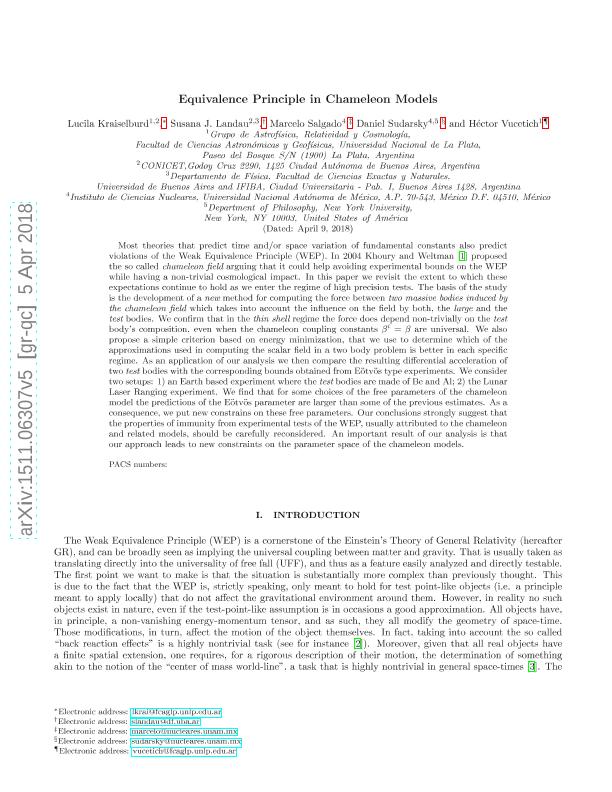Artículo
Equivalence principle in chameleon models
Fecha de publicación:
05/2018
Editorial:
American Physical Society
Revista:
Physical Review D
ISSN:
2470-0029
Idioma:
Inglés
Tipo de recurso:
Artículo publicado
Clasificación temática:
Resumen
Most theories that predict time and/or space variation of fundamental constants also predict violations of the weak equivalence principle (WEP). In 2004 Khoury and Weltman [1] proposed the so called chameleon field arguing that it could help avoiding experimental bounds on the WEP while having a nontrivial cosmological impact. In this paper we revisit the extent to which these expectations continue to hold as we enter the regime of high precision tests. The basis of the study is the development of a new method for computing the force between two massive bodies induced by the chameleon field which takes into account the influence on the field by both, the large and the test bodies. We confirm that in the thin shell regime the force does depend nontrivially on the test body's composition, even when the chameleon coupling constants βi=β are universal. We also propose a simple criterion based on energy minimization, that we use to determine which of the approximations used in computing the scalar field in a two body problem is better in each specific regime. As an application of our analysis we then compare the resulting differential acceleration of two test bodies with the corresponding bounds obtained from Eötvös type experiments. We consider two setups: (1) an Earth based experiment where the test bodies are made of Be and Al; (2) the Lunar Laser Ranging experiment. We find that for some choices of the free parameters of the chameleon model the predictions of the Eötvös parameter are larger than some of the previous estimates. As a consequence, we put new constrains on these free parameters. Our conclusions strongly suggest that the properties of immunity from experimental tests of the WEP, usually attributed to the chameleon and related models, should be carefully reconsidered. An important result of our analysis is that our approach leads to new constraints on the parameter space of the chameleon models.
Palabras clave:
COSMOLOGY
,
FIELDS
,
GRAVITY
,
TEST
Archivos asociados
Licencia
Identificadores
Colecciones
Articulos(CCT - LA PLATA)
Articulos de CTRO.CIENTIFICO TECNOL.CONICET - LA PLATA
Articulos de CTRO.CIENTIFICO TECNOL.CONICET - LA PLATA
Articulos(IFIBA)
Articulos de INST.DE FISICA DE BUENOS AIRES
Articulos de INST.DE FISICA DE BUENOS AIRES
Citación
Kraiselburd, Lucila; Landau, Susana Judith; Salgado, Marcelo; Sudarsky, Daniel; Vucetich, Hector; Equivalence principle in chameleon models; American Physical Society; Physical Review D; 97; 10; 5-2018; 1-35; 104044
Compartir
Altmétricas




